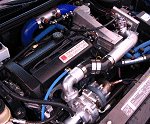

|
Street Class Unlimited Class
DOHC SOHC Ion Updated 1/05 For the most recent list of the fastest five cars click here. |
Ian's Turbo F.A.Q.by:Qksl2So you want to turbocharge you Saturn? Do you want to build your own turbo kit but have no idea where to start? Are you unsure of what turbo, what intercooler, or how to add fuel to your setup? Well, I have/am working on putting together a DIY Turbo installation section. I will try to cover everything that is needed to safely and effectively turbocharge your Saturn. There is a huge demand for something like this, so I will try to be as helpful as possible. Please shoot all questions to webmaster@qksltwo.com. What are your goals? How fast do you want to go? How much boost do you want to run,
and what kind of driving do you want to do? If you want a quick
street car for light to light racing and extra punch all over, you'll
want a low boost, small turbo setup. If you want a freeway terror,
prepare to do a larger turbo along with more engine modifications
to handle the power output. First, make that decision. You'll always
be compromising one aspect of performance for another. I'll write
this with what I know best: a well-balanced setup for the "average"
enthusiast. This is assuming a driver who wants reasonable daily
drivability, street The Motor Is your motor ok to boost on? Should you build the internals before
boosting at all? Mostly, this depends on how much boost you want
to run. Let me make this clear: it is entirely possible to run boost
for a long time on a stock motor in good condition. The key is proper
tuning and smart driving. That means not getting greedy with boost
and carefully maintaining the car. Minimally, changing plugs and
oil often is very important. You'll also want to make sure auxiliary
items are in good shape: fuel injectors, O2 sensor, fuel pump, etc...all
need to be in good working order. As for the motor, its best not
to boost on high Would boosting only about, say, 4 PSI be safe for a stock motor, assuming it passes leak-down and compression tests? If this is a daily driver and if I went with 4 PSI, I wouldn't crank it up (well, maybe, 5 PSI, but that's only if I was being excessively greedy, which I'm not) beyond that. Answer: Nobody runs just 4 PSI, period. You will turn up the boost
eventually, and planning a system around the lowest possible stress
is not a good idea. Over-design your system; that is to say, all
of the components to avoid high stress on any certain part. This
is part of the key to reliability. Don't ever design a turbo system
around "4 PSI" for instance. This is a recipe for disaster!
Not only is it highly likely that you won't stay at 4 PSI, or five,
or six, but if something fails you have no buffer zone whatsoever.
Changing atmospheric, driving, road, and mechanical conditions are
real world aspects driving a turbo car that one needs to take into
consideration. Build your turbo system to compensate for this! The
stock bottom end is good for well over To further go into the discussion about how much you can run on
a stock engine, it really isn't the boost, but the torque that makes
all the difference. Torque is directly proportional to the cylinder
pressures, and cylinder pressures are affected in a big way by boost,
among other factors. More torque equals more likely to break parts.
Horsepower (HP) is more efficient in that you can use less torque
(less strain) to let you go faster (less torque, delivered more
quickly). That is to say, a very strong low end or midrange is harder
on the engine, than a motor that makes its torque after the engine's
original torque peak, as you don't increase maximum torque, but
increase the rate of delivery. The essence of this is that you should
strive to make the most power with the least torque. A highly efficient
setup with a turbo blowing as little boost as possible through an
efficient piping, Would that be safe for a stock motor? I've heard we can take up to 6# safely, so I figured 4# would be alright. As stated above, the stock motor can take well over 200 hp to the wheels so long as tuning is taken care of. Physical limitations are going to be different on every motor, and anyone who gives you an exact answer to this has a lot of learning to do. Basically, that is all speculation. I can say, though, that the stock motor has been put through upwards of 12 PSI without issue. Again, its all in the tuning. That being said, naturally, if you are running more power on a stock engine, one wrong move, and you can "stick a fork in it and call it toast." Keep in mind that stronger internals do not mean more power. They are simply a way to have a "buffer zone" against engine damage, should detonation occur. Detonation that will break stock pistons or rings will break forged internals as well. Its just a matter of time. That being said, stock internals are good for lots of power if tuned correctly. The pistons on the older engines have thicker ring lands which are more resistant to cracking. All of the engines stock have 9.5:1 compression. This is good for low fourteens easily. For daily driving, though, I highly recommend boosting down: while this may not be necessary, it reduces stress on the motor. Believe me...5 PSI is more than enough for tooling around. What kind of turbo should I get? Ok, let me make this easy. For a stock Saturn motor looking for a great power-band, a T3 is the best way to go, period. For specifics, you'll want a .60 A/R compressor side and a .48 A/R exhaust. Right here, I won't go into the A/R's (Aspect Ratios) for simplicity reasons, but a larger number will flow more CFM at a given RPM than a smaller number. Therefore, a .48 exhaust ensures quick spool up, and a .60 compressor will flow a lot of air for lots of horsepower. Lag is the time that it takes for a turbo to get up to a speed where it produces boost, so the weight of the rotating wheels causes the lag. A larger T4 compressor or exhaust wheel is heavier, and the extra inertia takes it longer to get up to speed. The exhaust wheel is 70% of the weight, so the size and trim has the most effect on spool up. You can change the compressor wheel a lot more without affecting spool up too much. That is why a conservative .48 exhaust is good, while a larger .60 compressor is perfect. On a stock Saturn motor, this means boost in the 2000-3000rpm range, depending on your setup. The midrange is stronger with a nice surge of power. Then you run right into a rip roarin' top end, and a huge whack of power will lay you into the redline very quickly. On the freeway, lag as absolutely nonexistent: think about the go pedal and you're in boost pulling harder than any n/a Saturn can downshifting to third, while at 3000 rpm in fifth. From a roll, it will break the tires loose as the boost comes up. It's really quite amusing. It basically feels like an enormous engine. The T3 is also nice because it is easily rebuild-able, cheap and plentiful to find, and it can be upgraded to a T3/T4 later for more boost simply by changing the compressor wheel and housing. As far as other turbos, a 16G is a good choice. It's somewhat comparable to a T3, though less plentiful. A T28 is a great turbo, as well, but again, my favorite choice is the T3 60 trim. For a built motor: Precision turbos are the way to go. The SC34, at this moment, looks the most promising. However, you can find a standard t3/t04e from many places such as www.cheapturbo.com that will work very well. Look for a .48 exhaust stage III with a .50 or .57 compressor. It's a good match for a low compression, forged internals engine, and it produces some impressive power while remaining extremely street-able. You'll have 12 second power...but not much traction. Lag Lag? What's that? [http://www.geocities.com/turbosc2/sc2_hp.html (BROKEN)]
A turbo car clears its throat by 2000 rpm and is making more torque
by 2200 than a factory car. Below that it is exactly the same as
n/a. With a T3 sized turbo, you get a strong onset of boost by the
mid 2000 rpm range, and by 3000 you get more torque than a n/a Saturn
makes anywhere in the powerband. Up top, you simply get double the
power, at around 5-6 lbs of boost. Two engines, same weight. But
a MUCH wider powerband than a factory motor. Yes, despite what all
the old 2-valvers say, a turbo gives you the most versatile powerband
Skip to page 2, 3, 4 |
|




